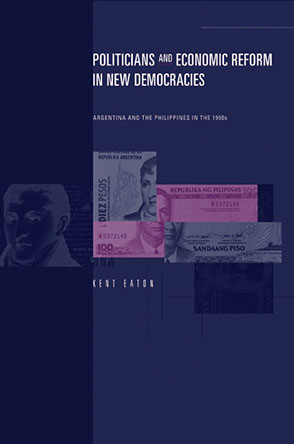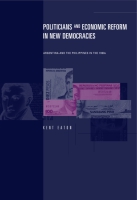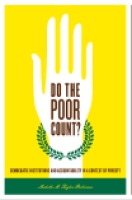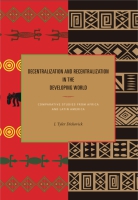
Politicians and Economic Reform in New Democracies
Argentina and the Philippines in the 1990s
Kent Eaton
Politicians and Economic Reform in New Democracies
Argentina and the Philippines in the 1990s
Kent Eaton
“Once countries successfully install democracy, usually the next hurdle is economic reform. Primarily investigating Argentina and the Philippines, but also considering other Latin American cases, Eaton shows that countries with party-centered politics are more likely to implement reform, whereas countries with candidate-centered politics are less likely. This book makes a significant contribution by synthesizing topics (legislators, party systems, bureaucracies, executive-legislative relations, and public policy) and regions (Latin America and Asia) that are not commonly compared. His study applies a wide range of methods, from following bills through legislatures to interviewing local actors and collecting local scholarship and archival materials.”
- Description
- Reviews
- Bio
- Subjects
In Argentina and the Philippines, presidents proposed similar fiscal reforms in the 1990s: expanding tax bases, strengthening tax administration, and redesigning tax revenue-sharing with subnational governments. Drawing on archival research and interviews with policy makers, Kent Eaton follows the path of legislation in these three areas from initial proposal to final law to reveal how it was shaped by the legislators participating in the process. Obstacles to the adoption of reform, he demonstrates, are greater in candidate-centered systems like the Philippines’ (where the cultivation of personal reputations is paramount) than in party-centered systems like Argentina’s (where loyalty to party leaders is emphasized).
To test his argument further, Eaton looks finally at other kinds of reform ventured in these two countries and at tax reforms attempted in some other countries.
“Once countries successfully install democracy, usually the next hurdle is economic reform. Primarily investigating Argentina and the Philippines, but also considering other Latin American cases, Eaton shows that countries with party-centered politics are more likely to implement reform, whereas countries with candidate-centered politics are less likely. This book makes a significant contribution by synthesizing topics (legislators, party systems, bureaucracies, executive-legislative relations, and public policy) and regions (Latin America and Asia) that are not commonly compared. His study applies a wide range of methods, from following bills through legislatures to interviewing local actors and collecting local scholarship and archival materials.”
“Eaton’s work helps fill an important gap in the institutionalist literature. His thoughtful and detailed empirical analysis demonstrates the prominent impact political institutions have on public policy. Given the tremendous problems caused by recurrent budget deficits in many developing countries today, the book’s focus on fiscal policy is particularly timely. Anyone concerned with the relationship between institutions and policy will benefit from reading this excellent book, as will those concerned more generally with economics and politics in Argentina or the Philippines.”
“This excellent book is a valuable contribution to the literature on the politics of neoliberal reforms in developing countries. Eaton challenges the idea that legislators have played a passive role in the implementation of economic reforms.”
“Eaton makes an important contribution to our understanding of the challenges facing new democracies as they undertake economic reforms, and the book will serve as a model for future scholars as they develop their research designs.”
“On the narrowly focused question of whether and how elected legislatures have an appreciable and variable impact on fiscal policy actions implemented in the neoliberal era in developing countries, this book makes a significant and well-researched contribution to our understanding.”
“In this important new book, Kent Eaton argues that—under democracies of varying quality—legislatures are quite important in determining the destiny of reform. The argument is indeed quite convincing and carefully made. . . . This book does exactly what good comparative politics should do: It is cross-regional, theoretically informed, clearly argued, and chock full of solid empirical detail.”
“In this important new book, Kent Eaton argues that —under democracies of varying quality—legislatures are quite important in determining the destiny of reform. The argument is indeed quite convincing and carefully made.”
“Indeed, this book does exactly what good comparative politics should do; It is cross-regional, theoretically informed, clearly argued, and chock full of solid empirical detail.”
Kent Eaton is Professor of Politics and Department Chair at UC Santa Cruz.
Also of Interest
Mailing List
Subscribe to our mailing list and be notified about new titles, journals and catalogs.





